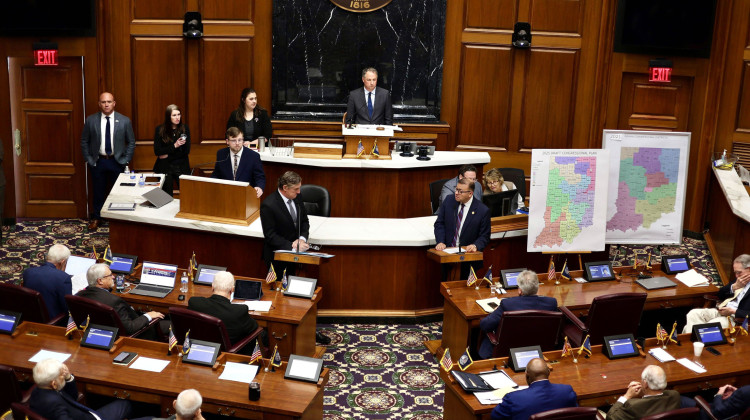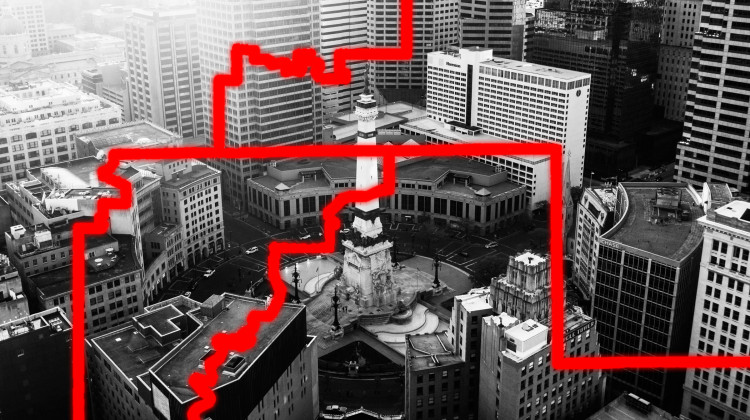
Black Church Coalition organizers Josh Riddick, left, and Rev. Joseph Colquitt, right. The organization announced a new initiative this week that aims to address multiple systemic issues, such as housing access and substance abuse resources.
(WFYI/Abriana Herron)Critics of police practices that have killed civilians in mental health crises – including Herman Whitfield III – announce a new initiative this week. Faith in Indiana’s Black Church Coalition says its new campaign aims to address multiple systemic issues, such as housing access and substance abuse resources. It also has a plan to engage more people as advocates.
WFYI's Abriana Herron spoke with Black Church Coalition organizer Josh Riddick to learn more.
Abriana Herron, WFYI: The Black Church Coalition is meeting Tuesday to talk about new initiatives, how is the organization shifting its gears?
Josh Riddick, Black Church Coalition: So we'd like to think of it as cranking up the intensity in which we've organized. So our base is been anywhere between two to 400 people. And we need to dramatically scale that up for the political opportunities that's ahead of us. There's obviously an election this fall. And while we want people to go vote, we also want people to realize voting is not the only tool in their tool belt to install and create political change. So many of the positive things that have happened, this community have come out of the organizing of Black and brown folks, and we want to see that more. We want to see more people engaged, because we believe the political opportunities before us are tremendous.
Herron: One of the things mentioned in your release ahead of the meeting are concerns about safety and a series of encounters with IMPD that have led to the death of three Black men. What would you like to see happen?
Riddick: Yeah, I think for, for us there, there has to be a culture shift within the department. That expressions of violence in the way we've seen them should not only be unacceptable, but they should be dealt with in a way that that removes folks from the institution that are causing that harm. Many of our leaders got engaged just weeks after our first public action in March of 2022 with the death of Herman Whitfield III. And the Whitfield's have been organizing and showing up in these beautiful ways that have been deeply motivating and inspiring to our folks, inspiring to me. Some of the work we've done around mental health has put us in conversation in relationship with organizations like the Center for police equity, police departments across the country that prioritize a continuum of care in how they engage people. We want to see that type of culture in our department. We want to see our staffing model structured in such a way that folks are getting the help that they need when they call. And that when folks, when folks understand when they call 911, it doesn't always have to be law enforcement as the response. So those are the type of big changes we want to see. And I think through the next six to nine months, we could hone in on some more granular details of what that looks like some particular policy or staffing, structures, leadership structures that we can consider. The beautiful thing about organizing work is that I don't come to the table with a list of solutions and say ‘Hey, folks, let's do this.’ We build that out together.
Herron: All right. Well, thank you again, for coming out here today. My final question is, would you like to add anything that you believe people should know about this new campaign launch?
Riddick: We are really excited for this campaign. With the Black Church Coalition. We believe that Black folks in Marion County have a tremendous voice and opportunity to shape the social and political fabric of our community. That if we align together, build together, what is possible is so much greater than what the city's maybe ever done before. We've just in two years, helped create initiatives that have never happened in the state of Indiana, push things that have never happened in the city of Indianapolis, the county of Marion County. That's just what the few 100 people that we have. I'm excited to consider what we can do together with 800 to 1,000 people. What's possible, we get 2,000 people. And I think we've seen it at a state level when Black folks in the city decide to move people across the city and state follow. And so if we can align across our collective self interest, and have a vision of a safe and healthy community together, I don't know what will get in our way.
 DONATE
DONATE







 Support WFYI. We can't do it without you.
Support WFYI. We can't do it without you.